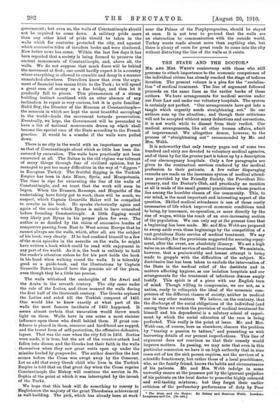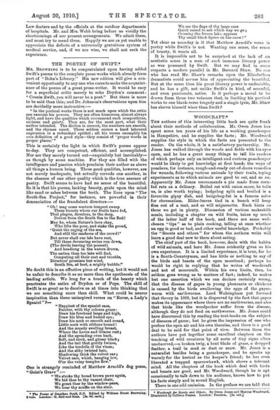THE STATE AND THE DOCTOR.*
Mn. AND MRS. WEBB'S controversy with those who still presume to attach importance to the economic competence of the individual citizen has already reached the stage of tedious iteration. The present volume is a plea for the "socialisa- tion " of medical treatment. The line of argument followed proceeds on the same lines as the earlier books of these authors. We have arrangements for medical service under our Poor Law and under our voluntary hospitals. The system is certainly not perfect. " Our arrangements have got into a tangle which urgently needs straightening out." So our authors sum up the situation; and though their criticisms will not be accepted without many deductions and corrections, it is not worth while to dissent from their verdict. Our medical arrangements, like all other human affairs, admit of improvement. We altogether demur, however, to the process of "straightening out" recommended by Mr. and Mrs. Webb.
It is noteworthy that only twenty pages out of some two hundred and sixty are devoted to voluntary medical agencies, and of these by far the greater part is taken up by a description of our eleemosynary hospitals. Only a few paragraphs are given to the contractual services rendered by the medical profession to their patients. A few rather disparaging remarks are made on the insurance system of medical attend- ance provided by the Friendly Society, the Provident Dis- pensary, and the Doctor's Club, and practically no mention at all is made of the small general practitioner whose practice lies among the humbler classes of the community. This, to our mind, is the most important and interesting aspect of the question. Skilled medical attendance is one of those costly necessaries of life which improved economic conditions tend to bring, by insurance, co-operation, or more directly by the rise of wages, within the reach of an ever-increasing section of the population. We can only say at the present time that a beginning has been made. Mr. and Mrs. Webb are prepared to sweep aside even these beginnings by the competition of a vast gratuitous State service of medical treatment. We say this advisedly, for the provisions suggested for securing repay- ment, after the event, are absolutely illusory. We set a high value on an efficient service of medical treatment. We maintain, however, that a praiseworthy and honest attempt is being made to grapple with the difficulties of the subject. No doctrinaire line has been taken to exclude the intervention of the State in the medical relief of the destitute and in matters affecting hygiene, as our isolation hospitals and our arrangements for the treatment of infectious disease amply testify. This spirit is of a piece with our English turn of mind. Though willing to compromise, we are not, as a nation, ready to relinquish the ideal of the economic com- petence of the different classes of society, neither in medical nor in any other matters. We believe, on the contrary, that the discharge of the social obligations of the individual (and among these we reckon the provision of medical treatment for himself and his dependents) is a salutary school of experi- ment by which the social education of the race is being perfected. This really is the point at issue. Mr. and Mrs. Webb can, of course, here as elsewhere, obscure the problem by "tearing a passion to tatters," and presenting us with harrowing details of our present imperfections. This line of argument does not convince us that their remedy would improve matters. In passing, we may note that even in this particular connexion we have it on high authority that in nine cases out of ten the sick person requires, not the services of a scientific functionary, but rather those of a local practitioner, who, as the family friend, knows theliabits and circumstances of his patients. Mr. and Mrs. Webb indulge in some unworthy sneers at the pressure pit by the ignorant prejudice of his patients on the local doctor to prescribe highly coloured and evil-tasting mixtures ; but they forget their earlier criticism of the perfunctory performance of duty by Poor
• Tha Siai. and Ma Doctor. By Sidney and Beatrice Webb. London Longmans and Co. [68. net.]
Law doctors and by the officials at the outdoor departments of hospitals. Mr. and Mrs. Webb bring before us vividly the shortcomings of our present arrangements. We admit them, and must try to mend them. Happily we are as yet unable to appreciate the defects of a universally gratuitous system of medical service, and, if we are wise, we shall not seek the experience.







































 Previous page
Previous page